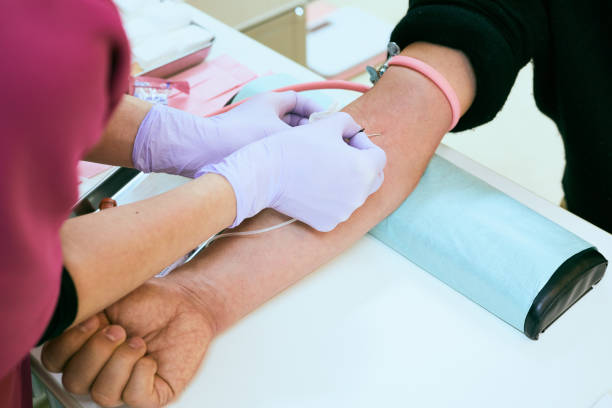Every Ounce Counts
Senior patient is collecting blood with a trusted clinic in Tokyo at a regular checkup.
February 24, 2022
Everyday someone is one ounce closer to death.
The US currently faces the worst blood shortage that they have seen in over a decade. For the first time, the American Red Cross announced that we are facing a national blood crisis.
With donations decreasing 10% since March of 2020, the American Red Cross has been experiencing an extreme loss from college and high school blood drives, as well as other factors such as COVID-19 or the flu.
In fact, during the COVID-19 pandemic, the Red Cross also faced challenges rooted from the surge in COVID-19 cases. There has been a 62% drop in college and high school blood drives due to the pandemic.
Not only have a decrease in blood drives and illnesses prevented more blood drives, the recent cold weather and staffing limitations have aided to the shortage.
The Red Cross supplies 40% of the United States’ blood supply, however blood product distributions have been limited. Hospitals now may not receive the amount of blood products needed, as they may not even obtain 1 in 4 blood products.
The demand for blood is constant and can only be obtained through donations. Blood cannot be manufactured, which is why the Red Cross urges people to donate blood.
This shortage presents risks towards patient care because doctors are left with the decision on which patient receives blood for blood transfusions and which patients have to wait until more blood becomes available.
According to Dr. Sandip P. Patel, an associate professor of medicine and clinical trials director at the University of California, San Diego, said that the need for blood is critical for trauma patients and patients undergoing surgery alike. He also stated that there are few methods that are as effective as blood transfusions.
Hospitals consistently receive patients in need of blood from accidents or health conditions such as sickle cell disease, cancer patience, or even COVID-19 cases.
While all blood types are needed, the universal type, O positive and O negative, are especially required in order to reduce the crisis. With the ongoing shortage, the Red Cross has limited blood distribution to hospitals, potentially endangering many patients in their care.
Kristen Mill from Spring Grove, Illinois has suffered from health disorders since 2008. Blood transfusions are necessary for her survival; however, due to the shortage, the hospital was unable to supply her blood type and Kristen waited for weeks before receiving her next blood transfusion.
Kirsten is only one of the many patients that require blood in order to continue to live. With many patients who constantly struggle with health disorders and depend on the blood of others, now is the time to donate to your local blood bank.
The Red Cross is accepting appointments for blood donations or platelets through the Red Cross Blood Donor App, through their website: RedCrossBlood.org, or calling 1-800-733-2767.






















































